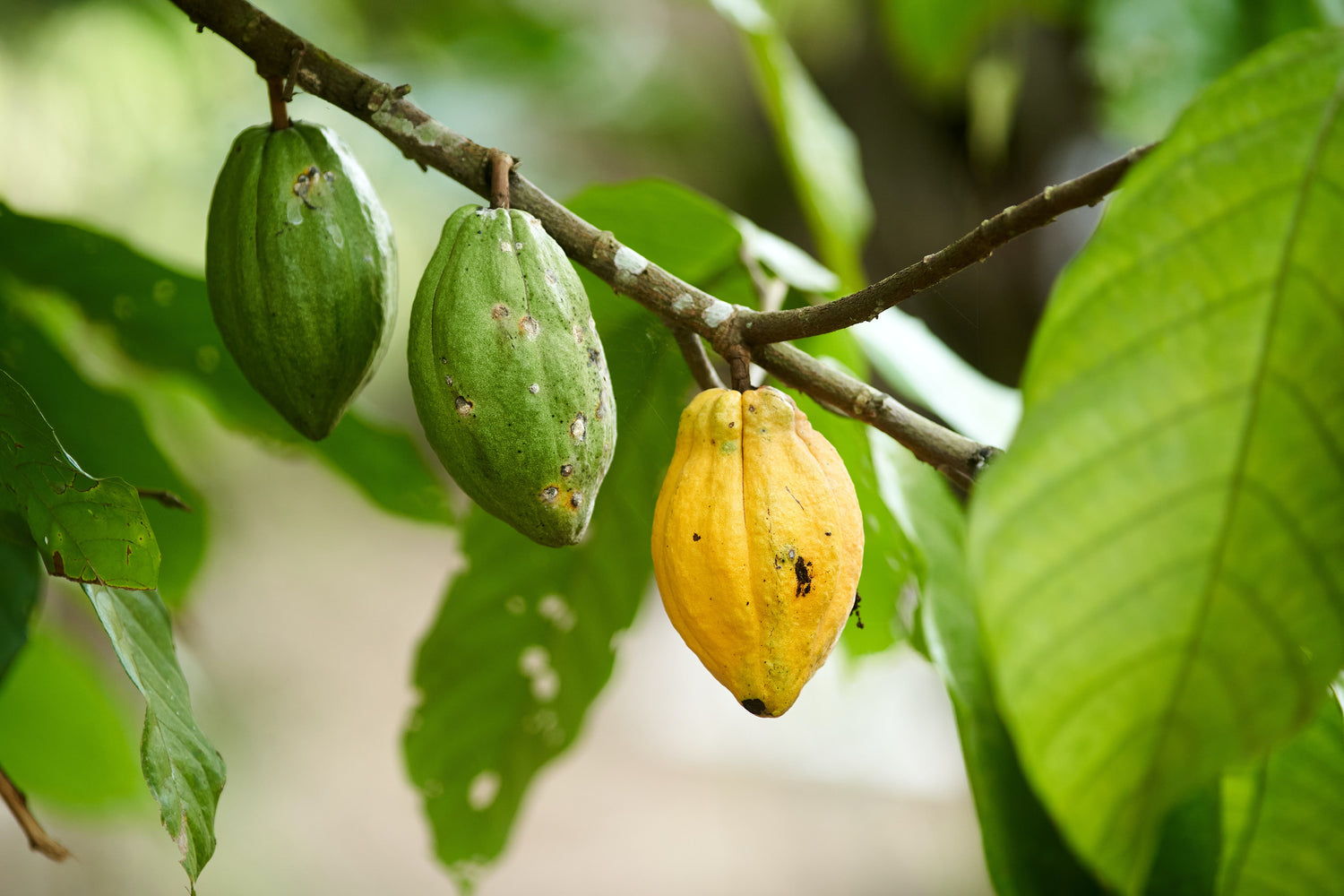The bitter truth about the world’s favourite sweet treat
No one likes to think about the sad realities behind their favourite products. However, when there are plenty of ethical alternatives out there, there’s really no reason to ignore the truth any longer.
When someone mentions the topic of modern slavery, our mind tends to gravitate towards things like fast fashion or the mining of precious gems. But did you know that the chocolate industry has its own dark story to tell?
Here’s what you need to know about the ethical issues facing the chocolate industry and what we’re doing at Love Cocoa to change it for the better.
Modern slavery in the chocolate industry
It’s easy to think of slavery as a thing of the past, or at least an extremely rare occurrence. But sadly, this is far from the truth. Thanks to the work of journalists and humanitarian organisations, we’re aware of its presence on cocoa farms around the world — the same farms that supply cocoa to some of the largest chocolate companies.
Western Africa, and particularly Ghana and Ivory Coast, supplies most of the world’s cocoa (around 70%) — and the area is currently battling major child labour and slavery issues for decades. While most child labour cases have been documented in these two countries, instances have also been found further afield on cocoa farms in countries like Brazil.
In an industry reliant on slim margins, exploitation is rife. Under increasing pressure to supply cheap cacao to chocolate manufacturers, and remain competitive in the market, farms resort to paying workers less than poverty wages, using child labour, or not providing any payment whatsoever. Even ‘certified’ farms have been found to ignore standards, like ticking off the requirement for clean bathrooms on checklists even though there are none on site.
Despite the global chocolate market being worth an estimated USD 113.16 billion in 2021, chocolate manufacturers continue to avoid paying a fair price for their cocoa. Practically no farmers in Ivory Coast or Ghana make a living wage, making it difficult to pay workers a living wage or invest money into improving working conditions. The chocolate manufacturers can afford to pay more for their beans, but they choose not to.
For those facing poverty and with families to support, accepting work on these cocoa farms is the only option they have. Some individuals are misled by traffickers that tell them a well-paid job is waiting for them, when in reality, it is zero or low pay and dangerous working conditions. Children are not exempt from this trafficking, with traffickers targeting poor families, misrepresenting education opportunities to parents, or simply abducting children to sell them to cocoa farms.
In 2021, police in Ivory Coast rescued 68 children from Burkina Faso who had been trafficked for work on cocoa farms. And while this might seem like a large number of children, it’s just the tip of the iceberg.
Child slavery on cacao farms
It is estimated that 2.1 million children from Ivory Coast (an area that accounts for 45% of the world’s cocoa bean production) and Ghana work on cocoa farms where they are exposed to harmful practices.
Instances of child slavery are still reaching headlines in the UK and internationally, but not always with satisfactory outcomes. In 2021, eight former child workers from Ivory Coast launched legal action against some of the world’s largest and most powerful chocolate companies — including Mars, Nestlé, and Hershey. Demanding compensation for negligent supervision, unjust enrichment, and intentional infliction of emotional distress, the lawsuit claimed that the cocoa farms “knowingly profited” from the illegal work of children.
You’d think that cases like this, which involve trafficking, coercion, and forced labour, would reach a successful verdict for the plaintiffs. However, this lawsuit was dismissed by a federal judge due to a lack of “traceable connection” between the defendant companies and the specific plantations where the plaintiffs worked.
This connection between chocolate companies and cocoa farms highlights a crucial issue for those trying to find solutions to the problem of slavery within the chocolate industry. With intermediaries playing a significant role in the cacao supply chain, it’s easy for chocolate companies to claim they can’t monitor aspects of their cocoa operations. And this ‘out of sight, out of mind’ mentality has a lot to answer for…
Issues with regulation
Cocoa production may rely on lots of intermediaries or ‘middle men’ within the supply chain, but this isn’t an excuse for powerful companies to neglect their ethical duties. It is rather convenient for chocolate manufacturers to claim that they can’t monitor every aspect of their cocoa’s production. And it’s easy for them to stay secretive about the inner workings of the industry.
Unfortunately, large chocolate companies have the power to exert influence on the media, and so somewhat control the information that reaches the public. Plus, groups and authorities have been known to restrict journalist’s access to cocoa farms where human rights violations are occuring.
There’s a lot of money to be made in the world of cocoa. And with so many vested in the cheap production of cocoa, it’s almost unsurprising that farm workers are facing horrendous issues like forced labour, low wages, and dangerous working conditions. With more financial backing and political influence than the average worker, chocolate manufacturers and cocoa farms can easily find ways to bypass ethical regulations, shift blame, and deflect responsibility.
Creating a better future for cocoa farm workers
It’s time for chocolate manufacturers to view their supply chain as a key aspect of their business — one that they have ethical responsibilities towards. If the farms only exist because the demand is coming from chocolate companies, it’s hard to argue that they aren’t directly involved in cases of slavery, mistreatment, and child labour.
At Love Cocoa, we think it’s time that chocolatiers addressed these issues head on and monitored their cocoa farms. By refusing to work with unethical farms, ensuring ethical procedures are followed, and observing areas for improvement themselves, it will become easier to establish rigorous safety and employment standards for workers.
More pressure should be placed on chocolate companies to report information about where they source their cacao. Initiatives to improve working conditions should be scrutinised and be placed under pressure to produce meaningful results. And ‘expressions of concern’ about slavery within supply chains should not be accepted as a substitute for action.
Luckily, we’re not alone with this thinking. Other chocolatiers and humanitarian organisations are working alongside us to enact change and usher in a better era of chocolate production. A new, ethical reality is on the horizon for the chocolate industry. However, we also need consumers to put ethics at the heart of their buying decisions and for large chocolate manufacturers to finally get involved.
Learn more about slavery and spread awareness
If you’re interested in learning more about slavery in the chocolate industry and spreading awareness yourself, there are lots of resources out there to help you.
Oxfam frequently shares news and resources on the chocolate industry, while The No Project has created lesson plans for teachers on the tricky-to-teach topics of human trafficking and modern slavery.
The Love Cocoa ethos
At Love Cocoa, we take a proactive stand against exploitation in the chocolate industry. And our ethical ethos extends way back into the past. James Cadbury’s great-great-great grandfather, John Cadbury, set up the legendary Cadbury chocolate brand nearly 200 years ago. As a proud anti-slavery campaigner himself, he built his company on strong ethical grounds and ensured the wellbeing of his workforce remained at the forefront of business concerns.
When James launched Love Cocoa, he wanted to ensure John’s key values remained at the heart of his own chocolate brand. Love Cocoa carefully sources all cacao from slavery-free farms and pays fair wages to all its workers — no matter their role in the production line. Not only this, but we’re also focused on creating climate positive chocolate. We ensure that our cacao is farmed sustainably and we plant a tree every product sold.
We’re proud of the change we’re making in the chocolate industry and we hope that we can inspire other chocolatiers to follow our lead. Love Cocoa shows that you don’t have to choose between making ethical, affordable, or delicious chocolate — you really can have it all.
Try our chocolate creations for yourself and discover your new favourite flavour. From strawberry champagne chocolate bars to salted caramel liquid chocolate truffles, there’s a world of heavenly chocolate nibbles waiting to be found in our online shop.
Why not browse our ethical, sustainable chocolates — like our chocolate bars, chocolate truffles, hot chocolate, vegan chocolate, chocolate hampers, corporate chocolate gifts, and sale chocolate.

